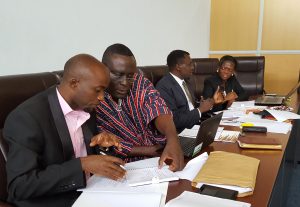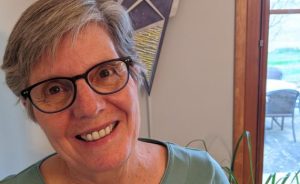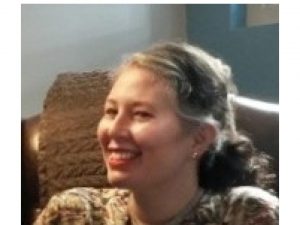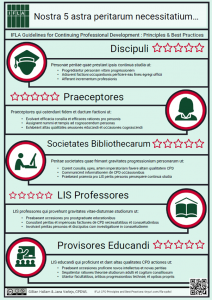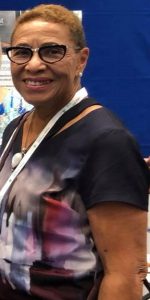EIFL photo: EIFL and National Library Authorities of Ghana, Kenya, and Uganda meeting to review continuous professional development of public librarians (2016)
From 2014 to 2017 EIFL (Electronic Information for Libraries – www.eifl.net) implemented extensive capacity building programmes in Kenya, Ghana and Uganda, aimed at development of technology-based library services in public libraries that had computers and internet access for public use. While working with local library authorities and training librarians, we observed that library systems, mainly for financial reasons, struggle to offer continued professional development (CPD) to assist librarians in providing modern and technology-oriented services to their communities. This lack of professional development support led EIFL to engage in the development of a new CPD strategy that is sustainable, country-wide, and affordable, by using skilled local trainers. From 2018 to 2020 we tested this strategy through capacity building initiatives in Kenya, Namibia, Zambia and Uganda and in a series of three blogs, EIFL will share key attributes and outcomes of this CPD approach.
In our experience, the key to the strategy, and to the success of CPD programmes based on this strategy, is assessment at the outset, of existing CPD systems, and of training needs of both libraries and librarians. To transform existing CDP practices into sustainable systems, with training provided by local trainers, EIFL worked with national library authorities. We started by meeting potential partners – Kenya National Library Services (KNLS), National Library of Uganda (NLU) and Ghana Library Authority (GhLA) – to review the CPD situation and particular needs in each country and to discuss next steps. At that moment KNLS was the most ready to take a commitment for a multi-year effort, so we started by planning a more specific intervention within the KNLS network. This was done collaboratively during a three-day meeting between the EIFL Public Library Innovation Programme (EIFL-PLIP) team and representatives of different departments of KNLS. Together, we came up with a vision of a CPD system for public libraries in Kenya as well as initial criteria for selection of librarians to become trainers.
The next step was a skills audit of librarians who were selected to become trainers. We examined candidates’ skills and confidence in 4 key areas, that were foreseen to become the backbone of the training of trainers (ToT) programme: 1) Training Abilities (principles of adult training, building training programmes and materials, running training events, evaluating training results); 2) Technology (using Microsoft office applications, internet searching, open and subscribed e-resources and strategies of digital skills training to community); 3) Development of New Library Services (community needs assessment, project management, fundraising and stakeholder management, monitoring and evaluation); 4) Communications and Advocacy (building messages, developing advocacy plans, conducting effective presentations, working with media). The information on competences of trainers was collected via a Google-based online survey and was used to shape the ToT programme as well as to assess the effectiveness of the programme, as we compared their skills before and after the training. Quantitative data was complemented by personal interviews with the trainers-to-be, where we talked to them about their background education, training experience, subject skills and professional interests and, finally, their personal traits and motivation to become trainers.
Lastly, and maybe most importantly, we wanted to find a way to assess the needs of public libraries for professional development and service provision. Through in-depth discussions with staff from different KNLS departments, the KNLS and EIFL-PLIP team identified gaps and challenges of existing training needs assessment practices, which comprised a bi-annual Training Needs Assessment survey through which librarians would indicate what they would like to learn. The weakness of this approach was that it generated information about librarians’ personal needs and interests, which were not necessarily aligned with the organizational goals of KNLS or the service improvement needs of a particular library. Also it was not always possible to respond to the training needs expressed by librarians, as most CPD happened through external opportunities offered by development organizations, which – though welcome – were not necessarily related to librarians’ needs.
To address this gap, EIFL-PLIP and KNLS co-developed a Capacity Building Framework, a self-assessment tool to be filled in by the heads of libraries in the KNLS network. The Framework looks at 7 areas of library operations, identified by KNLS as the key, such as Community Needs Assessment, ICT, Customer Service, Services and Programs, Collections, Library Facilities and Assets and Library Management. It enables the heads of libraries to assess their library in relation to an ‘ideal library’ situation through a system of indicators and evidence, used to assign a library to a Group A, B or C, where A meant good, B – medium and C – not very good. The application of the Framework includes three steps:
- The head of each KNLS branch library assesses the present situation / operations of the library and submits the information to KNLS headquarters.
- KNLS Staff Training and Advisory Committee (STAC) reviews and analyses the assessments provided by heads of libraries, to understand what capacity building is required in relation to library service development targets, and to set staff capacity building priorities for each library.
- KNLS STAC builds a plan for staff capacity building, and implements the plan, drawing on internal resources and external opportunities.
This Framework was piloted in 17 libraries and later applied to 45 KNLS branch libraries and provided valuable and deep insights on the current state of library operations and needs for capacity building. However, the complexity of the tool showed that it requires a significant amount of effort to apply and skills to analyze the data, so for the post training evaluation instead of open questions, we developed a more structured questionnaire with Likert scale response options for most of the questions.
To summarize our learnings from this process, we can say a comprehensive pre-assessment strategy is essential for the success and sustainability of CPD programmes. This strategy must consider capacity building at both the library level, where the need for service improvement should be evaluated, and at the individual level of trainers and local librarians, which leads to tailored training content adapted to the local context.
Watch out for our next blog, which will look at how we helped public librarians to become skilled Trainers!
To find out about other activities of EIFL’s Public Library Innovation Programme, please visit: www.eifl.net/plip
Authors:
SUSAN SCHNUER, EIFL’s Public Library Innovation Programme, Capacity Building Manager
For over 27 years Susan Schnuer has trained librarians, in developing and transition economy countries, to be agents of change in their communities. Her passion is to identify and coach talented librarians, helping them to explore their potential as leaders and trainers in their communities. Her philosophy is to ‘tread lightly’ by co-developing training programmes that are tailored to meet the unique needs of librarians in different countries or regions.
UGNE LIPEIKAITE, EIFL’s Public Library Innovation Programme, Impact Manager
Ugne Lipeikaite’s expertise in developing impact evaluation methodologies and tools for measuring the outcomes of public library services has grown over a period of 15 years. Ugne has contributed to the design and implementation of major international research projects to measure the impact of public internet access in libraries and the role of libraries in providing connectivity and digital skills in communities. Ugne has developed training courses and trained public and community librarians in several countries in Africa on how to assess the needs of communities and the impact of library services.
